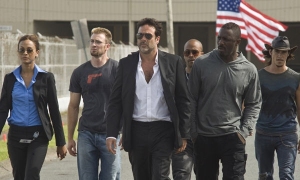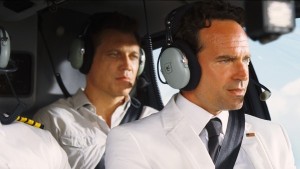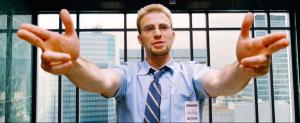Originally Posted on March 30th, 2012, at Playeraffinity.com
As far as introductions go, there are few as tightly controlled and crafted as the trailer, that vital piece of marketing designed to first expose a viewer to a film. Considering that trailers often determine the fate of multi-million dollar projects, it’s no wonder these three-minute elevator pitches have become just as important as the films they represent.
Trailers themselves are an odd media, as they’re one of the rare forms of advertising that’s actually enjoyed, and actively pursued, by their audience. In a sense, it’s an advertisers dream come true, as the proliferation of bite-sized media has not only widened the reach of trailers, but also created means for potential customers to willingly watch clips designed to invoke their purchasing power. Even the anticipation of trailers has reached ludicrous new heights; what does it say when movies such as Prometheus and Total Recall start their campaign with a trailer for the trailer?
The fetishizing of promos has clear drawbacks, as the pressure to deliver on an engaging snippet is made all the more difficult because of heightened—and often contradictory—audience expectations. A good trailer makes the viewer interested in novel ideas, but also plays to their established tastes (explosions, laughs, gore, etc.), a conflict that forces the editor to create a trailer that’s equal parts highlight reel, and curiosity stoker.
The temptation is to grab audiences using a little peek at the film’s big moments. Think about how many trailers now climax with a shot of a building falling over or something big blowing up. Of course, the danger there is that you’re giving the goods away for free, a bit like eating the frosting before putting it on the cake, and the final product is going to suffer because nothing will possibly be as good as that first taste. On the other hand, focusing on dramatics and the turns of a story won’t spoil the big moments, but it can hamstring enjoyment of the narrative.
Although often maligned for its transparent detailing of the plot’s major twists, trailers for 2005’s The Island showcased an identity issue formed from a radical second act twist, one severe enough to effectively split the film in two. It’s a case in which the editor has chosen advertising accuracy over secrecy, sacrificing not one, but two major plot developments to prep audience expectations accordingly. In truth, it’s a representative trailer. The mysterious and authoritative utopian setting is scrapped after the film’s opening act, replaced by CGI-laden chase scenes through a near-future city that’s perpetually at sunset.
So in other words, a Michael Bay film—but that’s not meant to be insulting (I swear). By citing Bay’s summer blockbuster credentials with mention of The Rock and Armageddon, the trailer for The Island creates an expectation from any audience member who’s even vaguely aware of the director’s style of filmmaking. Had the trailer focussed less on the pedigree, and held off on spoiling the big surprises, it would have made for a more engaging ad, but not a better viewing experience. Audience members enticed by the question of “what is the island?” would no doubt be jilted when they found out they had paid for a pristine future-conspiracy thriller that’s only 45 minutes mystery, and another 90 minutes bombastic fireworks/slow-mo camera rotations.
It’s also a case in which multimedia marketing comes into play; high concept sci-fi doesn’t translate to a 30-second TV ad quite as succinctly as “Michael Bay, Scar Jo, explosions!” Film advertising has long had a tendency to emphasize a movie’s flashiest moments in order to create a lasting impression, because when it works, it’s the difference between an ignored bomb, and a big hit. Promotional material for 2008’s Cloverfield heavily played up scenes of a devastated New York cityscape, along with the memorable image of a decapitated Lady Liberty. Cloverfield delivered sufficiently on the destruction teased, but when your film doesn’t have the budget for trailer shots emphasizing spectacle, intrigue is your best substitute, something Cloverfield had in spades.
With not even a title attached to it, the first trailer was a master class in sucker-punch setup, creating a cast of characters for one kind of movie, and then throwing them into an alien invasion, or a monster attack ... something, you're not sure what. Point being, you had to know what happens next. With just a taste of what was to come, the editors stoked public excitement by making them ask questions, and nothing keeps buzz going like curiosity. What happened to the Statue of Liberty? What is Cloverfield? And just what does this thing look like? Compare that to, say, John Carter, which was all spectacle and no speculation (other than “who the hell is John Carter and why should I care?”), and you can see how important it is for advertising to indulge our desire to see the blanks filled in.
Cloverfield managed to translate a need for answers into serious box-office returns, but the film’s positive reception came from delivering on the major promises made by the trailer. Although it’s never clear why it’s on the warpath, or what exactly the title is in reference to, the expectation of a big, cool-looking monster attacking New York was met.
But any good setup demands a proper payoff, and playing your cards too close to the vest can mislead audiences, or worse, make them feel like they’ve been fooled. Early spots for Inglourious Basterds were selling a hyper-stylized WWII action film in the grand tradition of previous Tarantino revenge films, but the final product was more a deconstruction of the medium than a gleefully sadistic gnatzi-killin’ good time.
Whereas Basterds was largely able to get away with its bait-and-switch advertising, other films aren’t quite so lucky. Drive ads caught eyes with their combination of brutal violence and synth pop-backed existentialism, but when audiences discovered that the film favored the latter greatly over the former, they were not pleased. Despite glowing critic reviews, the audience backlash over the deception was so severe it resulted in small box-office returns, and led one viewer to sue the film’s distributors over their “failure” to deliver the Fast & Furious-caliber action flick hinted in the trailers.
Granted, the braying of one crazy person shouldn’t condemn editors to absolute authenticity in trailers, but if trying to mislead the audience for the sake of subtlety is treated as false advertising, what’s the alternative? Is there middle ground between a straight plot summary and a curiosity factor? What it really boils down to is control of context, being able to show the audience what will happen in the film without them realizing what it all means until they’ve bought a ticket.
Now, I’ll plug Inception at every reasonable opportunity, but I can’t think of a better pair of previews than the teaser and official trailer produced for Christopher Nolan’s absorbing sci-fi masterpiece.
Much like Cloverfield, the dialogue-free first footage of Inception was primarily used to seed questions. How can a mind be a crime scene? What's going on with the gravity? What does "Inception" mean? It would be more than half a year before the first full-length trailer was released, but the sparse plot details provided only magnified audience interest. We’re told that Leonardo DiCaprio’s character is a specialist in mental security, and that dreams in this universe are somehow accessible. Beyond the introduction of such a novel concept, the trailer also helps us to understand the motivations of DiCaprio’s character, before showcasing a knockout montage of seemingly disconnected, yet memorable setpieces.
Anyone who’s seen the movie will pick out massive spoilers played out right in front of the audience’s eyes, but it’s all about context. The final act’s snowy hospital and ruined city settings are all heavily featured in the trailer, but we don’t have the slightest clue as to their import without seeing the rest of the movie. And like a lot of great trailers, the editors twist the context of pieces of dialogue to give an impression of the film that, while not entirely true, prepares the viewer for what’s to come. We know that DiCaprio’s goal is to return home, but the revelation early in the film that the woman hinted at in the trailers isn’t actually alive only deepens the mystery during the first viewing.
Similarly, the dramatic tension of the movie is bolstered when it is revealed that the definition of "Inception" established by the trailer is actually simpler than the real ambitions of the film. It’s not so much a bait-and-switch as it is a reinterpretation of the film’s actual content, which upon viewing, satisfies the expectations created by the advertisements, while also expanding on those expectations. It makes the experience of watching the film refreshing in the way that watching the trailer for the first time was, and that's how you know a trailer has been well-made.






